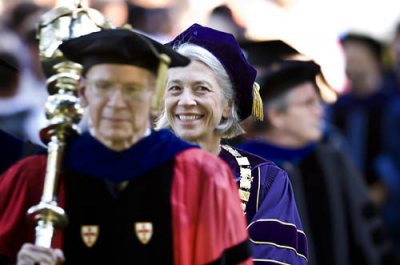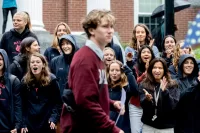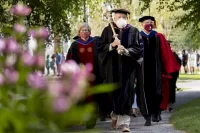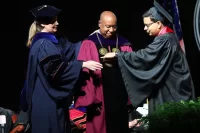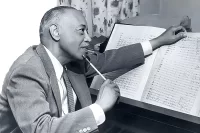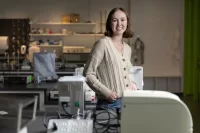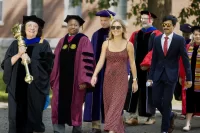
Hansen to new students: It’s about good choices
The ceremony beginning Bates’ 144th academic year on Sept. 9 took place on a choice afternoon, sunny and mild, and explored in depth the concept of choice — no small issue for 470 first-year students confronted with new freedom to make their own choices. (Students new to Bates also included one transfer, for a total of 471.)
“This is just the beginning of a long lifetime of making choices,” college President Elaine Tuttle Hansen said. Quoting Harry Potter creator J.K. Rowling, she said, “It is our choices that show who we truly are, far more than our abilities.”
She pointed out to the new students that a traditional residential undergraduate college like Bates is an accommodating arena for learning to make good choices — affording “the time, the space and the resources to explore lots of options,” as well as some buffering against the consequences of bad decisions.
If our choices show who we truly are, Hansen suggested, the new students might aspire to become “liberated consumers.” In contrast to the rampant infantilized consumption described by political theorist Benjamin Barber in the book Consumed, Hansen depicted the liberated consumer as one “who does not think he is free of the necessity of consuming — she is maybe even someone who likes to shop — but does not succumb to the pressure to consume mindlessly.”
She continued, “As individuals, it’s necessary and quite seductive to be focused on our personal consumption and our private choices. But as a society we know we must somehow make better collective, public, social choices about what and how we consume.”
“Somehow,” but how? Hansen offered guidelines that would serve anyone well as rules for living: valuing complexity, participation, commitment, real human relationships and deep focus on the challenges at hand.
Hansen’s theme harmonized with the college’s efforts, intensified this decade, to come closer to environmental sustainability, exemplified by this summer’s charge to the new students to advocate for curtailing climate change. But Hansen ultimately steered back to an idea that could be as relevant to residential life as to global responsibility.
She brought up the famous psychology test called the Marshmallow Experiment, in which young children are given the choice of having one sweet treat right away or having two if they can wait a while for it. 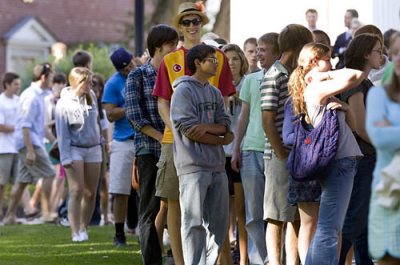
Referencing an article about the experiment in the May 18 New Yorker, Hansen explained that kids who can wait tend to be more successful as adults than the immediate gratifiers. The same self-control that enables them to wait for the treat, it turns out, translates into myriad practices and habits that cultivate adult success.
Noting that disciplined decision-making is as important to institutions as to individuals, Hansen segued to the topic in store for the featured convocation speakers: brief updates on the latest phase of the collaborative Bates planning process that began two years ago.
Each speaker was involved with a team developing recommendations for the college in a particular area. Leslie Hill, associate professor of politics and special assistant to the president for diversity initiatives, spoke first. Her team developed recommendations for the college on the theme of Learning at Bates.
Reminding listeners that “learning is what Bates is all about,” Hill wove together imperatives to deepen Bates’ intellectual community; use its tangible and intellectual resources wisely; and embrace diversity as something that needs to be enhanced at Bates and something that will enhance Bates.
Bates’ commitment to excellence drives its commitment to diversity, Hill explained. Bates can’t attain excellence without embracing the disparate qualities and contributions of all who come here to teach and to learn. “As importantly,” Hill said, “preparing all students for leadership and service in a multicultural, rapidly changing, and highly competitive world is our job.”
Matthew Côté, associate professor of chemistry and associate dean of the faculty, summarized the findings of the Natural Sciences and Mathematics in the Liberal Arts team. Of the team’s 11 recommendations, he highlighted two: the prioritization of a new facility where math and the sciences could be taught under one roof, and the redoubling of efforts to secure funding for student-faculty research.
Côté also mentioned four pedagogical projects now under way as a result of the team’s work: an integrated math and science course sequence, an effort to broaden computing experience and resources throughout those disciplines, a grant-funded process (undertaken jointly with Bowdoin College) to explore the teaching of quantitative reasoning and a project to improve communication within the science and math division.
Kirk D. Read, associate professor of French, co-chaired the team investigating The Arts in the College and the Community. Read’s humorous and expansive talk used his own experiences in theater as an undergraduate to illustrate the value of the visual and performing arts in the liberal arts context.
The late-afternoon ceremony also included addresses by Dean of the Faculty Jill Reich; Daniel Gimbel ’10, president of the college’s student government; and William Blaine-Wallace, multifaith chaplain.
